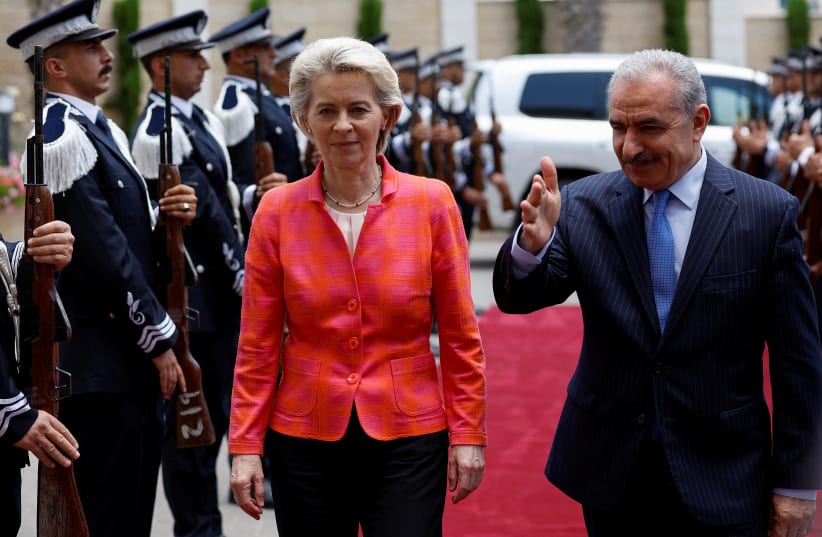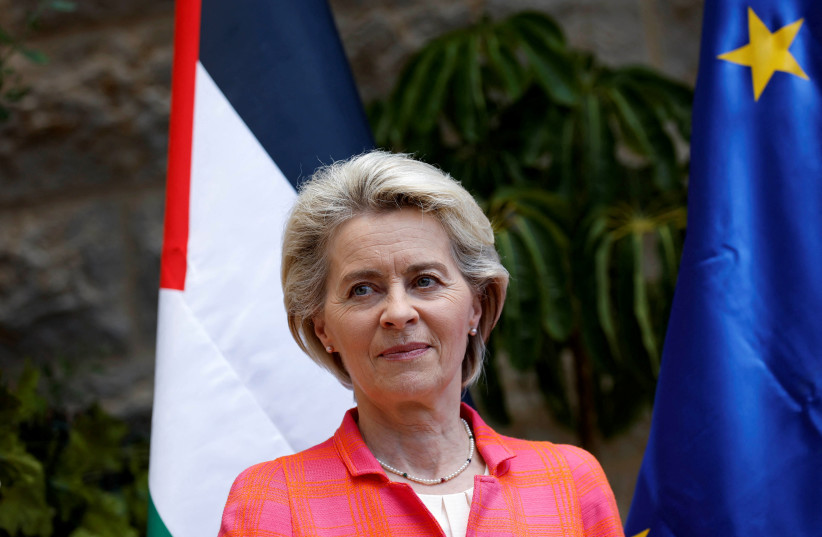The EU on Tuesday failed to pass a proposal to withhold about 5% of its support for the Palestinian Authority in light of antisemitic incitement from its textbooks, after 14 months of freezing funding.
Instead, the European Commission – whose president, Ursula von der Leyen was in Israel on Tuesday – decided to pay the PA without new conditions, despite the findings of an EU-commissioned study by the Georg-Eckert Institute confirming in June 2021 that Palestinian textbooks feature antisemitism, glorification of terrorism and erase Israel.
The European Commission approved a €224.8 million aid package for the Palestinians on Tuesday, in addition to previous contributions of €92m. to UNRWA and €25m. specifically for humanitarian aid. The EU projected €1.152 billion in financial support for the Palestinians for the years 2021-2024.
Last September, Prof. Dr. Eckhardt Fuchs, director of the Georg-Eckert Institute, told the European Parliament 2021 while some books follow UNESCO standards, “in other subjects they do not. Here you find incitement to hatred, antisemitic parts, and this we have said very clearly and differentiated.”
Thirty-two members of the European Parliament from several parliamentary groups called on von der Leyen in a letter this past March to set conditions for funding the Palestinian education sector.
“Years of negotiations with the PA and repeated Commission pledges of ‘zero tolerance’ for antisemitism have unfortunately failed to bring about the desired change,” the letter said. “Palestinian children continue to be abused as they are being taught to hate. Asking the PA to revise these books is not an imposition but a self-evident and non-negotiable duty.”
When the European Parliament reviewed the 2021 budget in April, it condemned incitement in Palestinian education and demanded that “all text books and materials supported by Union Funds which are used in schools must be in line with UNESCO standards of peace, tolerance, co-existence and non-violence.”
Yet, the aid package includes €145.35m. for salaries and pensions of PA civil servants, including those who write textbooks.
The aid package also includes €3m. to “promote gender responsive policies and laws in the occupied Palestinian territory.”
Palestinian textbooks glorified Dalal al-Mughrabi, a Palestinian responsible for the murder of 38 Israelis, including 13 children, within the context of female empowerment, the report said, adding that there are “no further portraits of significant female figures in Palestinian history.”
Soon after the vote, a EU official said they do not “impose reforms to our partners,” but the PA is working on reforming its education sector.
“The EU does not fund textbooks, but we support the Palestinian education sector”
EU official.
“The EU does not fund textbooks, but we support the Palestinian education sector,” the official said. “The EU is committed to supporting high-quality education in Palestine. This is a vital contribution to ensure peaceful coexistence, tolerance and mutual understanding.” The EU seeks to “work hand in hand with the PA on this, including on the basis of the study by the Georg Eckert Institute.”
“The EU has no tolerance for incitement to hatred, violence as a means to achieve political goals and antisemitism in all its forms,” the official added. “These principles are non-negotiable for the Commission. Any material that goes against them... has no place in textbooks or classrooms.”
Reactions to the decision
Daniel Schwammenthal, director of the American Jewish Committee’s Brussels-based Transatlantic Institute, said: “The EU had the historic opportunity and obligation to take a clear stand against antisemitism and incitement and for peace between Israelis and Palestinians but unfortunately decided to waste it.”
“This decision contradicts the EU’s core values, its declared goal of advancing a two-state solution and ignores the European Parliament’s repeated calls to end such incitement in Palestinian schoolbooks supported with EU funds,” he said.
“The decision is simply incomprehensible given that the Commission’s very first EU Strategy on Combating Antisemitism, released just eight months ago, explicitly states that the EU must ensure that external funds are not misallocated to activities that incite hatred and violence towards Jews.”
@vonderleyen @eucopresident If EU is committed to fighting anti-Semitism, then why disburse money to PA again? EU funded study noted PA curriculum contains anti-Semitism & support for terrorism! EP also called to condition funding until curricula is in line with UNESCO standards.
— Charlie Weimers MEP (@weimers) June 14, 2022
Marcus Sheff, CEO of IMPACT-se, which studies textbooks in the Middle East, said: “The PA textbook issue is now too important to simply disappear from the agenda of the Commission and Parliament.”
“The fact is that, as of today, no improvements to the textbooks have yet been made,” he said. “On the contrary, increased levels of antisemitism in the new study cards and direct calls for violence were condemned just last month by the Parliament.”
The European Parliament adopted a resolution in 2021 calling on EU funding to be conditional on removing incitement, Sheff said.
“This decision reflects the view of millions of Europeans represented by elected members of the EU Parliament who clearly want to see an end to the abuse of their taxpayer money until positive changes are made,” he said. “They and their elected MEPs are not going to change their minds because Ms. Von der Leyen would like the issue to disappear.”

